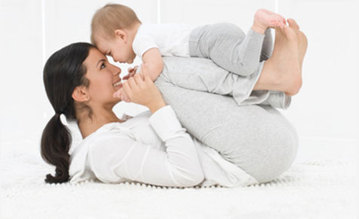
Having a baby changes your life -- it also changes your body. You may be surprised by some of those changes if you're a new mom, wondering why it takes so long for your belly to shrink, how to lose the baby weight and whether your body will ever be the same. If you look at some celebrity moms out there, you may think you should emerge from the hospital looking as though you were never even pregnant. But, the reality is a little different. Having a baby affects every part of your body and, despite what's going on in Hollywood, it can take up to a year for your body to make a full recovery. Find out what you can do to help your body bounce back and lose the baby weight in a healthy way.
Why do I Still Look Pregnant?
One of the first thing new moms notice after having a baby is the fact that they may still look several months pregnant for awhile after giving birth. This is absolutely normal. Remember, you had a baby in there for nine whole months. From the moment you give birth, your body starts working to shrink your belly back to its pre-pregnancy state, or something close to it, but it's a slow process. It takes about four weeks for your uterus to contract to its normal size, and many women will lose about 8 to 20 pounds during that first two weeks as the body gets rid of all that extra fluid. It will also take time for your hips and pelvic area to shift back to their pre-pregnancy state, so it's normal for things to be out of whack after giving birth.
How Do I Lose This Baby Weight?
Though you may be eager to jump into a workout program or diet, easing into light exercise is crucial for keeping your body safe and injury-free. Even the fittest moms may have trouble getting back to exercise. After all, having a baby is a major ordeal and something you'll need time to recover from. You'll need clearance from your doctor and, depending on what kind of birth you had, it may be 4 to 8 weeks before you can engage in serious exercise.Breastfeeding can help you lose weight, requiring an extra 500 calories from you a day and helping reduce some of the fat you gained during pregnancy. If you do breastfeed, make sure you're giving your body the fuel it needs for that extra energy demand. Now isn't the time to go on a diet; restricting your calories too much can reduce your milk supply, and losing too much weight (more than two pounds a week) can actually release toxins that wind up in your milk.
The good news is, you can still exercise if you're breastfeeding. Studies show that moderate exercise won't affect milk production as long as you're giving your body enough calories.
Obstacles to Exercise You may be eager to lose weight by ramping up your activity, but exercise can be tough during the first few months after giving birth. Just some of the issues you may face:
- Exhaustion and fatigue -- These are common after giving birth, especially if you're breastfeeding, which can deplete your energy. Be aware of your energy levels, and only do what you can handle.
- An Erratic schedule -- For the first few weeks and months after you give birth, your baby's feeding schedule may change constantly, making it tough to follow any kind of normal routine.
- Time constraints -- You may find that you only have a few minutes here or there for exercise. If that's the case, take advantage of the time you have, and don't be afraid to spread your workouts throughout the day.
- Mood swings -- As your hormones get back to normal, you may have some ups and downs, perhaps even dealing with postpartum depression. Exercise may help your mood, but you should talk to your doctor about the best way to handle your situation.
- Guilt -- Many new moms feel guilty when they take time for themselves for exercise. It's tough to remind yourself that you'll actually be a better mom if you focus on getting stronger. Doing so will also set a good example for your child.
- Split your workouts -- Short workouts spread throughout the day are just as effective as continuous workouts.
- Keep it simple -- If you have a few minutes while the baby sleeps, take some laps around the house or trips up and down the stairs. Exercise doesn't have to be complicated, it only has to get you moving.
- Find support -- Talk to friends, family or neighbors about how they've handled having a baby and staying in shape. You'll be amazed at the creative ideas out there.
- Focus on what's important -- It's easy to get stressed out about losing weight, especially after inhabiting a body so different from the one you've been used to for most of your life. You will get back to normal, even if your body isn't exactly the same. Give yourself permission to enjoy your baby and your body, even if it's not what you hoped it would be.
Next Page:
Your Postpartum Workout And Diet:
 RSS Feed
RSS Feed